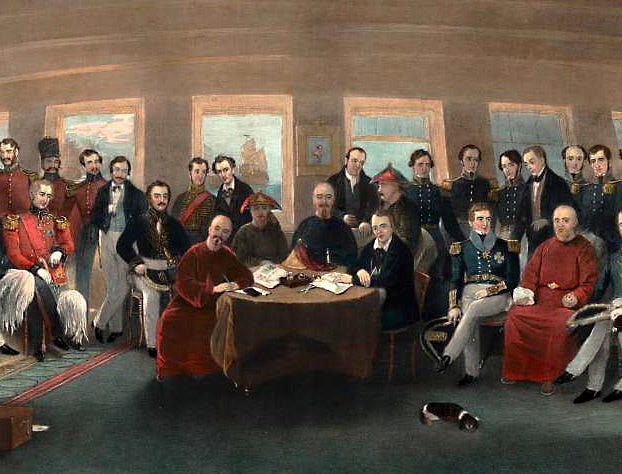How important is "Century of Humiliation" in China?
Will China use history to ask for reparations?
I forget exactly when the term “Century of Humiliation” became a phrase widely cited by Western intellectuals to talk about China. But I have to admit, when I first heard of this term, I struggled to find the exact Chinese word for it.
To be clear, without being reminded, I know exactly what this term refers to: roughly a century of humiliation, unequal treaties, wars, and suffering when China was weak, stretching from the 1840 Opium War all the way to (arguably) the end of WWII.
What I mean is that I struggled to find the corresponding Chinese phrase that is as popular in China as the “Century of Humiliation” in the West. The fact that I struggled here, while many of you might assume an average Chinese person should instantly know the corresponding phrase, is a telling sign that I wish to explore in this essay.
To be fair, this phrase does exist in China. After some research (but only after some research), you can find it somewhere. For instance, in Xi Jinping’s 2015 speech commemorating the 70th anniversary of the end of WWII, he said:
The victory of the Chinese People's War of Resistance Against Japanese Aggression was a triumph for the entire Chinese nation. It not only completely shattered Japanese militarism’s attempt to colonize and enslave China, but also abolished the unequal treaties signed with imperialist powers since modern times, allowing China to wash away a century of national humiliation. This marked a major turning point in history—never again would China return to the era of repeated defeats in the face of foreign invasions. The victory laid a solid foundation for China's independence and liberation, established a historic turning point for the great rejuvenation of the Chinese nation, and provided the essential precondition for its realization.
中国人民抗日战争的胜利,是整个中华民族的胜利。它不仅彻底粉碎了日本军国主义殖民奴役中国的图谋,而且废除了近代以来与列强签订的不平等条约,使中国得以洗雪百年国耻。历史因此而发生重大转折,近代以来中国人民抗击外来侵略屡战屡败的历史一去不复返了!抗日战争的胜利,为中国的独立和解放奠定了坚实基础,为实现中华民族伟大复兴确立了历史转折点,提供了根本前提。
But sheer existence does not mean significance. In the speech above, Xi Jinping used the word “百年国耻”, which literally translates as “A century of national humiliation/shame.” But this is not a very famous phrase, at least not in contemporary China. A more often cited one is “百年屈辱 A century of disgrace/humiliation”. And another phrase that I hear much, much more often than these two is “勿忘国耻 Never forget national humiliation”.
What’s even more noteworthy is that it’s not those phrases that make up the bulk of contemporary Chinese imagination of that period. It’s the imagery. While Westerners may refer to this period with a single phrase, the Chinese think of this period in terms of images. It’s the image of Qing officials signing unequal treaties with the British in Nanjing and with the Japanese at Shimonoseki. It’s the image of the Summer Palace on fire. It’s the image of the Qing Navy destroyed. It’s the image of Versailles, which demanded that China cede Shandong to Japan. It’s the image of September 18, 1931, when Zhang Xueliang, the Young Marshall, effectively gave away Manchuria to the Japanese without firing a shot. It’s the image of the total destruction of China’s best-equipped armed forces in the Battle of Shanghai across the river from colonial quarters, where Western revelers live their lives as usual by stark contrast. It’s the image of severed heads and mutilated bodies in Nanjing in 1938.
“Century of Humiliation”, as an English term, is a catch-all phrase that’s designed to contain all of these images above and serve as a framework of explanation for the motivations of modern-day China. But I have to say, though, this phrase appears much more (perhaps 100 times more, even 1000 times more) frequently in Western discourse of China than it does in actual China. The Chinese economy is developing rapidly? They are responding to the Century of Humiliation. The Chinese government mandates a strong industrial policy? This is because they are thinking about the Century of Humiliation. China is having border disputes? They want to avenge the Century of Humiliation, of course!
I asked around a bit about the origin of the popularity of “Century of Humiliation” in the West, but haven’t received a satisfactory answer yet. Maybe one of you could help me here. (Regarding “勿忘国耻” though, someone told me Wang Zheng’s 2012 book Never Forget National Humiliation: Historical Memory in Chinese Politics and Foreign Relations was influential for those in Anglophone academia who study the historical memory of modern Chinese history.)
At this stage, it seems to me that the English term “Century of Humiliation” has all the hallmarks of a linguistic device found and popularized by Western intellectuals themselves to encapsulate their own understanding of China, and then took the central stage in the discourse environment.
Similar things happen in reverse, too, and Chinese scholars are not immune to this practice either. For example, when I wrote the piece discussing Ne Zha 2, and there was a paragraph where I discussed the differences in historical political systems between China and Europe. There, I tried to invoke a line that many high schoolers in China learned from textbooks about the fundamental feature of the old feudal system of Europe:
“The lord of my lord is not my lord, the vassal of my vassal is not my vassal.领主的领主不是我的领主,附庸的附庸不是我的附庸.”
To research for that piece, I tried to find the original text from the West about this line. Only that I couldn’t, and to my great surprise, my AI told me it seemed that the line was coined by some Chinese scholars(!)
In both “Century of Humiliation” and “Lord of my lord is not my lord”, the observing side tries to understand the observed side by creating simple abstractions. But this “observer-imposed abstraction” in turn becomes the reality that the observers live in.
We should always be mindful of these oversimplified, manufactured realities that we create. At least when it comes to the “Century of Humiliation” narrative, I can see there are at least three major perils associated with it.



